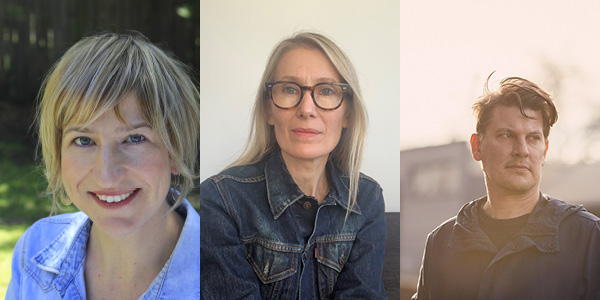ABR is delighted to announce the shortlist for the 2022 ABR Elizabeth Jolley Short Story Prize. The shortlisted stories, which appear in our August issue, are (in alphabetical order):
‘Dog Park’ by Nina Cullen
‘Natural Wonder’ by Tracy Ellis
‘Whale Fall’ by C.J. Garrow
The overall winner, who will receive $6,000 from the total prize money of $12,500, will be announced at a special online ceremony at 6pm on 11 August. This is a free event and all are welcome but please contact us to register your interest at This email address is being protected from spambots. You need JavaScript enabled to view it. so that we can send you the Zoom link on the morning of the event.
The 2022 Jolley Prize was judged by Amy Baillieu, Melinda Harvey, and John Kinsella. The judges’ report, as well as the full longlist, can be found below.
The Jolley Prize Shortlist
 The 2022 Jolley Prize shortlisted authors
The 2022 Jolley Prize shortlisted authors
(L-R): Nina Cullen, Tracy Ellis, and C.J. Garrow
Nina Cullen for ‘Dog Park’
Nina Cullen is a Newcastle-based writer whose work has appeared in various Australian and international publications. She has just finished a collection of linked short stories and is working on a novel.
Tracy Ellis for ‘Natural Wonder’
Tracy Ellis lives in Sydney and works as an editor in digital and print media. She has a Master’s in Creative Writing from UTS and was previously longlisted for ABR’s Calibre Essay Prize.
C.J. Garrow for ‘Whale Fall’
C.J. Garrow is a Melbourne writer whose fiction has been shortlisted for various international prizes. His story ‘Egg Timer’ was shortlisted in the 2020 Jolley Prize.
Full longlist
‘by the hour’ by Diana Clarke (New Zealand)
‘Dog Park’ by Nina Cullen (NSW) - shortlisted
‘Case Notes’ by Sonja Dechian (Vic.)
‘Natural Wonder’ by Tracy Ellis (NSW) - shortlisted
‘Whale Fall’ by C.J. Garrow (Vic.) - shortlisted
‘And Then There Is Pink’ by Madison Griffiths (Vic.)
‘Glads’ by Susan Hettinger (United States)
‘half-moons filled with jam’ by Andy Kovacic (NSW)
‘Born for You’ by Magdalena McGuire (Vic.)
‘The Mend’ by Bruce Meyer (Canada)
‘Blowing Up’ by Alec Patrić (Vic.)
‘Not-John’ by Jonathan Ricketson (Vic.)
‘Zamek’ by Alex Skovron (Vic.)
‘human material’ by Tracey Slaughter (New Zealand)
Judges’ Comments
This year we received 1338 stories from thirty-six different countries, a testament to ongoing international interest in the Jolley Prize and the magazine. Writers explored themes and topics including the pandemic, climate change, grief, desire, parenthood, and community across a range of genres. Here are the judges’ comments on the three shortlisted stories (presented here, as in the issue, in alphabetical order):
In the tense and atmospheric story ‘Dog Park’, Georgie takes her young son Max on a midday visit to the park where she watches from a shaded bench while he plays. Georgie’s protective love for her son infuses the story even as her desperate longing to shield him from potential pain or humiliation leads to growing tensions and an unsettling confrontation. ‘Dog Park’ is a tender examination of the evolving relationship between an anxious mother and her growing child that is filled with nuanced observations and telling details. The complex interactions between the characters in this story are particularly convincing.
In ‘Natural Wonder’, the narrator watches over three boys – her son and his two cousins – as they spend the first days of a new year playing at a beach on Sydney harbour. This story of children swimming and fencing with toy lightsabers on the sand has a gently melancholic undertow: it emerges that the cousins have experienced the recent trauma of losing their mother. The narrator feels a strong urge to protect and comfort her nephews but she is also drawn to ideas of escape and freedom. The story is remarkable for its quietness, acknowledgement of knotty feelings, and the room it makes for small miracles.
The bullying of Bernard Tusk at a school for boys ‘of shallow prospects’ is conveyed in a wry, uncanny, and almost defamiliarising way in ‘Whale Fall’, which uses the beaching of a whale carcass as a metaphor for pointless death. As an implicated but also threatened observer, the narrator takes us through the destruction of Tusk who, like all the younger boys, vaguely seeks ‘cool’, but can’t attain it. The triggering complicity of the narrator is both strangely self-exonerating and self-accusatory as he tries to figure out his role between collusion and empathy. The story skilfully examines a fraught complicity and guilt.
ABR warmly acknowledges the generous support of ABR Patron Ian Dickson AM, who makes the Jolley Prize possible in this lucrative form. We congratulate all the longlisted and shortlisted authors.


If you are an ABR subscriber, you will need to sign in to post a comment.
If you have forgotten your sign in details, or if you receive an error message when trying to submit your comment, please email your comment (and the name of the article to which it relates) to ABR Comments. We will review your comment and, subject to approval, we will post it under your name.
Please note that all comments must be approved by ABR and comply with our Terms & Conditions.